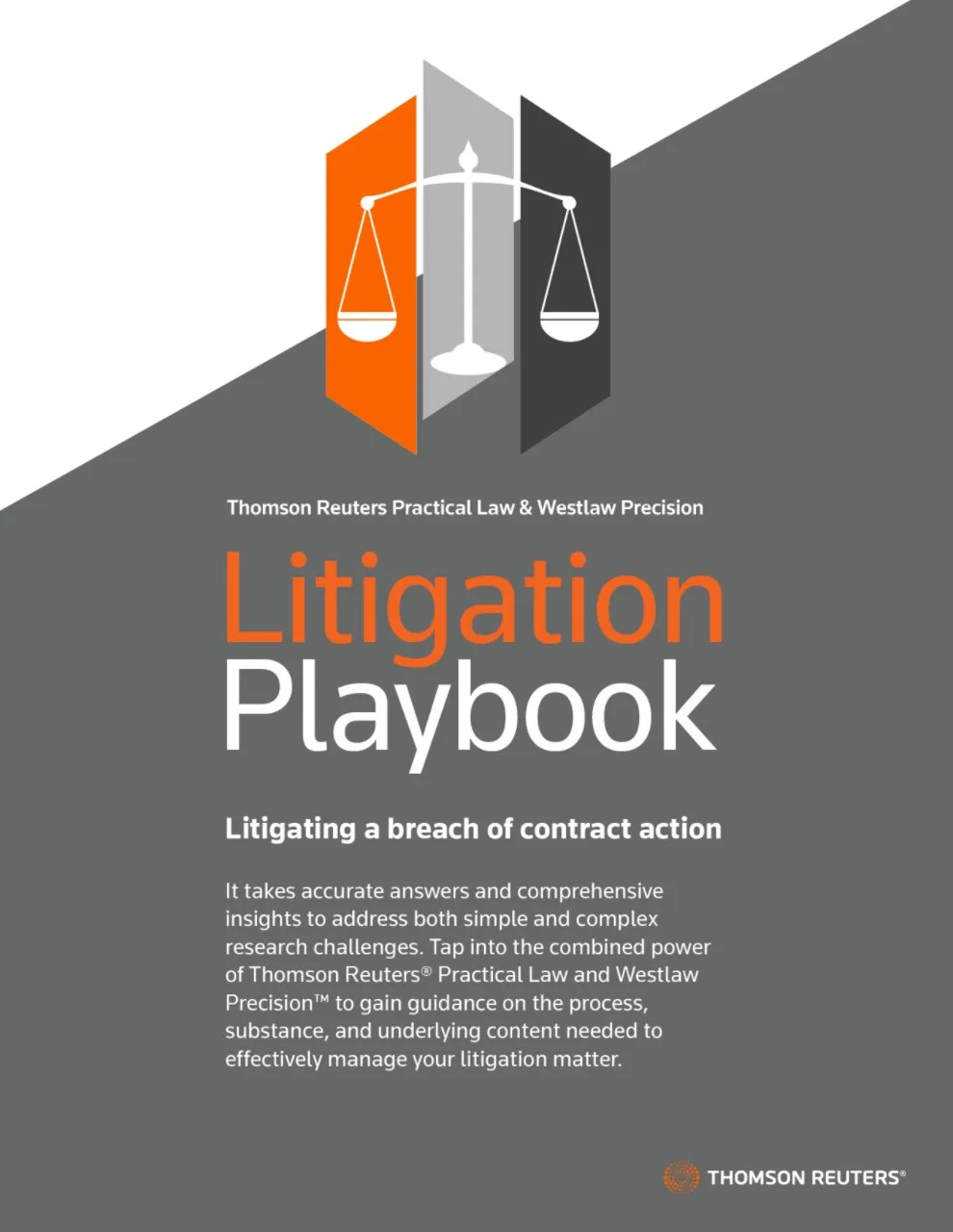Disputes arising from breaches of contracts are inevitable, requiring thorough consideration of contractual elements and legal options.
Legal terms • contract • breach of contract
Just as contracts are an essential part of the day-to-day business relationships in nearly every sector of public and private life, so too is adjudicating disputes born of their adoption. While good management and preparation can help prevent many of these disputes before they rise to the level of litigation, conflict in contract law is inevitable.
If a party fails to fulfill the obligation of a contract that they freely entered into, it will be termed as a breach of contract. In legal terms, a breach of Contract is defined as breaking any of the promised terms of a legally enforceable contract by a party without a lawful excuse.
The type of litigation that follows an accusation of a breach of contract, generally, depends on what type of contract was crafted in the first place, and what promises were purported to be broken. Below, we explore some of the key considerations of these disputes and subsequent lawsuits.
Jump to ↓
| How does a breach of contract happen? |
How to avoid a breach of contract
| Proof of breach |
| Legal remedies and damages |

AI news and insights
Industry-leading insights, updates, and all things AI in the legal profession
Join community ↗How does a breach of contract happen?
A breach of contract occurs when one party fails to fulfill its obligations as specified in the contract without a lawful excuse. This action of breach of contract is termed as the cause of action, based on which a party is legally empowered to file a case in the appropriate court for breach of contract. This failure can take various forms, such as failing to deliver goods or services as promised, not completing work within the agreed timeframe, delivering defective or substandard goods, or not paying for goods or services rendered.
For a breach of contract to occur, a contract must have existed in the first place. This begs the question, “What is a contract?” A contract is a formal, legally binding agreement between two or more parties. This agreement creates “mutual obligations that are enforceable by law.”
How to avoid a breach of contract
A breach of a contract may occur for several reasons. Here are five key ways to reduce the risk of a breach:
- Reduce ambiguity
Ambiguity in contract terms is one of the most common causes of breaches. To avoid this, review the contract thoroughly before finalizing it. Ensure the terms and clauses are straightforward and not open to interpretation.
2. Contract management and documentation
Missed deadlines for payments, deliverables, or milestones often lead to breaches. Factors like failure to adhere to timelines, incomplete obligations, and poor tracking systems contribute to these issues. Using contract management tools and keeping thorough documentation can help avoid such risks.
3. Reduce reliance on third parties
A breach may occur if a third party fails to meet deadlines or quality standards. To minimize this risk, reduce reliance on third parties and communicate deadlines to third parties wherever possible.
4. Check jurisdictional laws and party eligibility
Ensure the contract complies with the jurisdiction’s laws and that all parties are legally eligible to enter into an agreement.
5. Force majeure clause
Include a force majeure clause to account for unforeseen events like natural disasters, wars, or pandemics. Clearly define what constitutes such events and outline the next steps. In the case of Popich v. Fidelity & Deposit Co., the contractor could not find labor after a hurricane to complete the contract. The Court of Appeal of Louisiana held that Hurricane Betsy did affect the contract to build a house. However, it did not amount to the level of excusing the failure to perform the contract as the difficulty was remote, showing the utmost of addressing what should be included.
Types of contract breaches
There are several common types of contract breaches. These breaches can be broken down into five major classifications, which are as follows:
Minor
A minor breach of contract, also referred to as an immaterial or partial breach of contract, occurs when the non-breaching entity is merely entitled to the actual damages resulting from a breach, explains the Peck Law Group. For example, a contract might state a vendor is required to serve soft drinks for a catered birthday party in green plastic cups. If the vendor shows up with yellow cups, the terms of the agreement would technically be violated, although it would not likely excuse the party host from having to pay the catering bill. At most, they would be due whatever costs were actually incurred from the minor breach, which in this case may very well be none.
Material
A material breach is a more substantial violation of the promises of a contract. In a legal sense, material refers to “important information, generally significant enough to determine an issue.” In a material breach of contract case, a court might find one party’s failure to perform its obligation was so severe the aggravated party would be entitled to a more robust remedy. These might come in the form of economic damages, injunctive relief, or a court order for performance.
Anticipatory
This form of a breach occurs when it is inevitable one party will be unable to perform an obligation when such a performance is contractually due. In these instances, the non-breaching party may attempt to sue for damages immediately, and that party does not need to wait until the breach actually occurs.
Actual
In contrast to the anticipatory breach, this comes after a given performance is expected, rather than before the above-stated event.
Mutual
This breach of contract occurs when both parties choose to break the terms of a contract agreement. This may occur after a substantial change in circumstances surrounding an agreement.
 |
An example is when both parties do not fulfill their obligation where the buyer does not pay the consideration, and the seller does not deliver the goods. In the case of KVC Waffles Ltd. v. New Carbon Company, LLC, the Maryland District Court recognized the theory of “mutual default” and reiterated that “damages are recoverable by a party in a contract action only when such party has fulfilled its obligations under the contract up to the time of the other party’s breach.”
Mutual breach may also be triggered where the parties to the contract believe that there is substantial economic benefit in breaching or repudiating the contract. For example, in an agreement to sell cotton to make clothes, after entering into the contract, the price of cotton increases while the price of cloth decreases. Here, there is less incentive for the buyer to purchase cotton to make clothes on a lower margin, and there is more incentive for the seller to terminate the existing contract and sell cotton elsewhere at a higher rate.
Proof of breach
A judge adjudicating a breach of contract claim must consider many factors. A judge may consider whether the party suing the breaching party had performed its part of the contractual obligations, or not.
Most fundamentally, perhaps, a judge must decide if a valid, legally binding contract existed in the first place. In order to do so, that judge must decide if each of the key elements of a contract is present. As such, contracts have several distinct and important existential facets: offer, acceptance, awareness, consideration, capacity, and legality.
Offer — One party promising to do something, or conversely, promising to refrain from doing a particular action
Acceptance —The unambiguous nature by which an agreement is solidified. This may be done verbally, or through performance or deed
Awareness — Both parties acknowledge the contract agreement exists
Consideration — When something of value is offered in exchange for the above-stated action or inaction; the value that induces the parties to enter into the contract
Capacity — Individuals must have the ability to reasonably understand what entering a contract agreement means; individuals compromised by, for example, illegal drugs, may be found to lack the capacity for understanding or comprehending contract law
Legality — Valid contracts must fall in line with existing laws of the jurisdiction
Similarly, opposing counselors will likely grapple over questions regarding any actual damages or losses that might have occurred, any modifications to the agreement that may have taken place, and if any breach of the agreement actually took place. Further, they may attempt to assign a legally valid excuse for justifying the breach of contract.
In the case of a contract that is documented in writing and signed by the parties or their authorized representatives, it is easier to prove the existence of a contract as well as an event of breach of contract, when compared to an oral contract.

Playbook by Practical Law
Litigating a breach of contract action: The answers you need and how to proceed when litigating a matter
Download free playbook ↗Legal remedies and damages
If a breach of contract is shown to have occurred, that is, the non-breaching party succeeds in proving that the other party failed to meet the requirements of the obligations imposed by the contract, then it is incumbent upon the court to ensure the wronged party is justly compensated. This compensation can come in many forms. The “overarching goal of contract law is to place the harmed party in the same economic position they would have been in had no breach of contract occurred. As a result, the default remedy available for a breach of contract is monetary damages.”
In general, damages in a breach of contract case are limited to what is listed in the contract, and as such, courts usually do not award punitive damages as they would in a tort case. This reluctance comes from a legal theory known as “efficient breach,” which claims it is sometimes economically beneficial from a societal standpoint to breach a contract and then pay the requisite damages. Additionally, unless the element of fraud or misrepresentation is present, breaching a contract will not amount to the commission of a criminal offense.
Sometimes, a court may order a “specific performance,” in which the breaching party will be expected to attempt to fulfill their contractual obligation to the best of their ability. This is usually prescribed to unique assets such as real estate.
Amount of damages that may awarded by the court
The court, upon entering a finding that the party against whom the case for breach of contract is filed is guilty, may award damages to the non-breaching party. However, as above said the damages cannot be punitive or in the form of a penalty.
The amount of damages paid to the non-breaching party is calculated based on the loss suffered and the amount required to put the person in the same position as before the contract. These types of damages to restore the condition of the non-breaching party are known as compensatory damages.
For example, if there is a contract for the supply of goods and the seller fails to deliver the goods to the buyer, forcing the buyer to procure the same from elsewhere at a higher rate. It will be reasonable for the court to award the difference to be paid by the seller for the price of goods purchased by the buyer. These types of damages are also known as direct damages.
Examples of a breach of contract
The breadth of these lawsuits can range from nominal damages related to home improvement projects all the way to hundreds of millions of dollars when big tech and other economic giants are involved. There are lots of ways a contract can be breached.
One such example is when one company fails to execute a previously agreed upon business merger. This happened when a federal judge in the Southern District of New York ruled against RPM Mortgage after it failed to execute its planned merger with Partner Re. RPM was ordered to pay almost $11 million after being found to have “willfully breached its obligations” by not showing up to the closing proceedings.
Another example of damages payable for breach of contract is the case of Sun Microsystems, Inc. v. Microsoft Corp. The plaintiff claimed pre-decided liquidated damages of $35 million for disclosure of Java Code by Microsoft, amounting to a breach of contract. The case was later settled for more than $20 million paid by Microsoft to Sun Microsystems. This case underscores the importance of maintaining confidentiality and protecting the intellectual property of the other party.
An example of the enormity these cases can reach is the $242 million recently awarded to a subsidiary of Antero Midstream after Veolia Water Technologies was found to have committed fraud and breach of contract by the District Court of Denver County, Colorado.
More resources
Ultimately the purpose of the contract relates to what it provides: the consideration. For contractual purposes, consideration includes the value that has been agreed upon, whether that is an action or an item. Property, services, and even protection from harm, are all examples of contractual considerations.
Originally published March 25, 2024.

CoCounsel Legal
Find answers to more complex questions with AI, trusted content, and expert insights
Go professional-grade AI ↗







